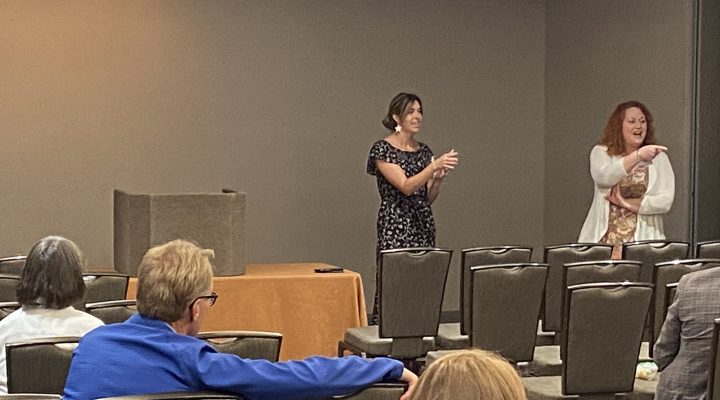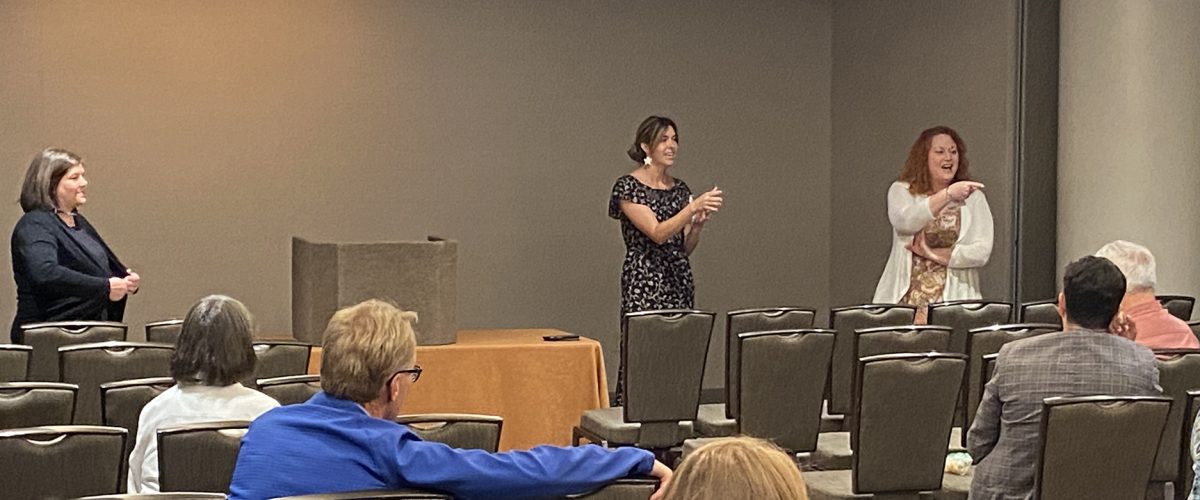The ongoing attack on public education is prompted by fear, orchestrated across state lines and fueled by money, participants at the 2022 Cooperative Baptist Fellowship General Assembly learned.
But supporters can make a positive impact for the greater good on multiple levels, Sharon Felton, Rachel Gunter Shapard and Cameron Vickrey said in a workshop titled “Save Our Schools: How Individuals and Churches Can Advocate for Public Education.”
“There are so many reasons people are told to be afraid of public schools,” reported Vickrey, director of communications and development for Fellowship Southwest and former associate director of Pastors for Texas Children. “I’ve found my peers finding every excuse not to send their children to public schools. … This has created a cultural crisis.”
“In 2011, I started hearing grumblings in public education about standardized testing. People said it’s almost impossible for students to pass, and then schools were labeled as failing. So, there was incentive to move students into private schools,” said Felton, an associate pastor at Faith Baptist Church in Georgetown, Ky., and a founder of Pastors for Kentucky Children, but at the time an associate pastor in Texas.
When she moved from state to state, she heard the same criticisms of public schools, “Texas and Kentucky are kind of different,” she observed, noting the duplication of criticism piqued her curiosity. “I found out there is a (widely distributed) playbook for complaining about public schools. … The American Legislative Exchange Council is pouring money into defunding public education.”
“I found out there is a (widely distributed) playbook for complaining about public schools.”
“Public education educates every kid — for free,” she added. “So, it’s all about the money, and there’s a lot of it up for grabs.”
Shapard, a regional vice president of Together for Hope and a founder of Pastors for Florida Children, illustrated the corruption of siphoning money away from public education and its devastating effects on children.
She told about a boy — “the student who always tried the hardest” — from a poor Florida family who was recruited to attend a voucher-funded school the last two years of high school. A mentor who cared about him discovered the school located in run-down church facilities. All the teachers were members of the church, and none had teaching certificates and classroom experience.
After graduation, the church’s pastor and wife pressured the boy to attend a private university, where he piled up debt but learned he was not prepared to succeed, she said. When he returned home, a university that specialized in helping students like him thrive told him they could not admit him, because his high school did not prepare him for college.
“This is what is happening on the ground in a school with vouchers,” Shapard said. “Our tax dollars were funneled to this school, which was created to keep this church alive. Basically, they forced him to go to a private school. He came home with load of debt. Then he was unable to get in a school that could have helped him.”
“Our tax dollars were funneled to this school, which was created to keep this church alive.”
The voucher system, which siphons funds from public to private schools, let down this young man and thousands like him, she said, adding: “Our legislators allowed this to happen. … We did this to this young man. We allowed this to happen.”
“The bottom line is (voucher systems and unregulated charter schools) affect children’s futures,” Vickrey said. “We hear this is all about ‘parental choice’‚ their right to their tax dollars. But we have a responsibility to ensure we are providing quality education for all children.
“It’s not just about my kids or your kids. If we follow the teachings of Jesus, we will work to ensure the common good — what’s right for all children.”
Ensuring the common good involves voting — both for lawmakers who will support public education and oppose expansion of charter schools and voucher programs, as well as for strong school boards, the panelists said.
“We’ve all got to pitch in and see that our voices are heard,” Vickrey said. “Just stand up for public education. Partisan issues (such as book-banning and Critical Race Theory, a legal assessment of systemic racism condemned as “making white children feel guilty”) does not have a place in nonpartisan elections, where school board members are supposed to represent the needs of all students.”
She cited four steps individuals and churches can take in support of public education:
- “If you can, send your children to public schools. I know that’s not popular. … But it’s important. And for parents who are afraid, just visit your public schools. They’re not as scary as you might think.”
- “Even if you don’t have children, get involved in your public schools.”
- “Tell people about (the strong need for and advantages of) public schools.”
- “Be aware and vote.”
Churches also can contribute by partnering with public schools, Felton added.
“We sit down with them and ask, ‘What do you need?’” she reported. “Go in and listen. Say, ‘We are here, and we are a congregation with lots of volunteers. What can we do?’”
She described how churches go into schools to encourage teachers. Other churches provide volunteers for whatever principals say the schools need — from helping with lunches, to reading with children, photocopying papers, helping with traffic lines and providing “backpack” programs that send children home with food to sustain them in-between school meals.
Such involvement informs members of those churches, Felton said. “The best thing about having your congregation help schools is members see what is happening — such as teachers loving on children and helping them learn how to read,” she explained.
“Public schools are doing kingdom work. They teach everyone and love on everyone.”
“Public schools are doing kingdom work. They teach everyone and love on everyone. It’s a perfect place for us as a church to come alongside. We can say, ‘We see you, we love you, and we advocate for you.’”
Advocacy for schools provides another avenue of congregational support, Shapard reported.
Public education comprises a major segment of state government budgets, she said, urging: “Advocate for fair funding systems. Provide a just education system for all. You don’t have to be an expert. Groups in your state are doing this work. You can partner with them. You can simply write letters to your legislators. Let them know you are watching.”
And go visit legislators, Felton added. “When you walk into a legislator’s office, you have a powerful voice,” she said. “They will listen to you more than to a lobbyist. … If you’re not a pastor, take your pastor with you.”
Related articles:
It’s time to stop the insanity that is killing public education | Opinion by Mark Wingfield
Texas Baptist Congressman attacks public school advocacy group on Twitter


